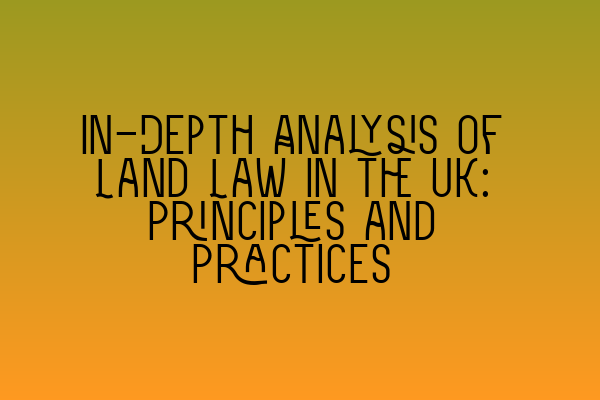Welcome to SQE Property Law & Land Law, where our team of expert solicitors, writers, and SEO professionals are dedicated to providing you with the most comprehensive information on all aspects of land law in the UK. In this blog post, we will delve into an in-depth analysis of land law, exploring its principles and practices. Whether you are a law student preparing for the SQE exams or a legal professional seeking to expand your knowledge, this article is designed to equip you with the essential insights into this complex area of law.
The Foundation of Land Law
Land law in the UK is primarily governed by a combination of statutes, common law principles, and equitable principles. The fundamental objective of land law is to establish and protect rights and interests in land and structures built upon land.
One of the key principles of land law is the concept of ownership. The registered proprietor, often known as the freeholder, holds legal title to the land. However, land law also recognizes various other interests that can exist alongside the freehold title, such as leasehold interests and easements.
Understanding the different types of interests and rights in land is crucial for any legal professional dealing with property matters. Our SQE 1 Practice Exam Questions and SQE 1 Practice Mocks FLK1 FLK2 articles offer excellent resources for testing your knowledge and preparing for the SQE exams.
The Transfer of Property Rights
One of the primary functions of land law is to facilitate the transfer of rights and interests in land from one party to another. This process is conducted through a legally binding document called a deed.
Deeds play a pivotal role in land law as they ensure the validity and enforceability of property transfers. They also serve as evidence of the legal rights and obligations associated with the land. It is essential to understand the requirements for a valid deed, such as the need for consideration and the presence of the necessary signatures, in order to ensure the integrity of property transactions.
Our SQE 2 Preparation Courses provide comprehensive guidance on property transactions, including drafting and executing deeds, as well as the intricacies of conveyancing. These courses are designed to equip aspiring solicitors with the skills and knowledge necessary for a successful career in property law.
The Doctrine of Estates
In land law, the concept of estates refers to the different levels of ownership that exist in relation to land. The doctrine of estates classifies these levels of ownership into various categories, such as fee simple absolute, life estate, and leasehold.
Understanding the different types of estates is vital for drafting legal documents, advising clients, and resolving disputes. For example, when drafting a lease agreement, it is crucial to correctly identify the terms and limitations of the leasehold estate being created.
If you are a law student studying for the SQE exams, our SQE 1 Preparation Courses offer comprehensive coverage of land law topics, including the doctrine of estates, to help you excel in your studies and exams.
Land Registration
In the UK, land registration is governed by the Land Registration Act 2002. This legislation establishes a compulsory system of registration for land, which aims to provide certainty and transparency in relation to land ownership and interests.
The land registration process involves submitting an application to the Land Registry, providing clear and accurate details of the land, its boundaries, and any rights or interests that exist over it. Once registered, the Land Registry issues a title certificate, which serves as conclusive evidence of ownership.
It is crucial for legal professionals to understand the intricacies of land registration, as it directly impacts property transactions, due diligence, and resolving disputes. Our team of expert solicitors is well-versed in land registration matters and can provide you with the guidance and assistance you need to navigate this complex area of law.
Conclusion
Land law in the UK is a complex and ever-evolving area of law that underpins the transfer of property rights and the protection of interests in land. Understanding its principles and practices is essential for legal professionals operating in this field.
At SQE Property Law & Land Law, we are committed to providing you with the most comprehensive insights into land law. Whether you are studying for the SQE exams or seeking expert advice, our team of solicitors, writers, and SEO professionals are here to support you every step of the way.
For more information on the SQE exams, including important dates and registration details, please visit our SRA SQE Exam Dates article.
Thank you for visiting us at SQE Property Law & Land Law. We look forward to assisting you with all your land law needs!
